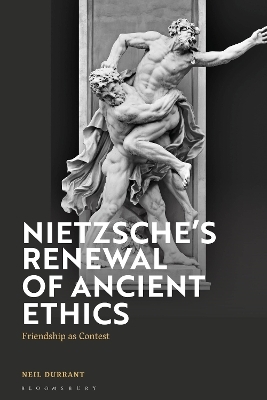
Nietzsche's Renewal of Ancient Ethics
Friendship as Contest
Seiten
2024
Bloomsbury Academic (Verlag)
978-1-350-29891-0 (ISBN)
Bloomsbury Academic (Verlag)
978-1-350-29891-0 (ISBN)
Nietzsche’s Renewal of Ancient Ethics connects different strands in Nietzsche studies to progress a unique interpretation of friendship in his writings. Exploring this alternative approach to Nietzsche’s ethics through the influence of ancient Greek ideals on his ideas, Neil Durrant highlights the importance of contest for developing strong friendships.
Durrant traces the history of what Nietzsche termed a ‘higher friendship’ to the ancient Greek ideal of the Homeric hero. In this kind of friendship, neither person attempts to tyrannize or dominate the other but rather aims to promote the differences between them as a way of stimulating stronger and fiercer contests. Through this exchange, they discover new heights—new standards of excellence—both for themselves and for others.
Durrant shows how the development of this approach to personal relationships relied on Nietzsche rejecting the Christian ideals of love and compassion to build an ethics which incorporated aspects of evolutionary biology into the ancient Homeric ideals he was himself wedded to. The resulting ‘higher friendship’ is strong enough to include not only love and compassion, but also enmity and opposition, expanding our notion of what is good and ethical in the process.
Durrant traces the history of what Nietzsche termed a ‘higher friendship’ to the ancient Greek ideal of the Homeric hero. In this kind of friendship, neither person attempts to tyrannize or dominate the other but rather aims to promote the differences between them as a way of stimulating stronger and fiercer contests. Through this exchange, they discover new heights—new standards of excellence—both for themselves and for others.
Durrant shows how the development of this approach to personal relationships relied on Nietzsche rejecting the Christian ideals of love and compassion to build an ethics which incorporated aspects of evolutionary biology into the ancient Homeric ideals he was himself wedded to. The resulting ‘higher friendship’ is strong enough to include not only love and compassion, but also enmity and opposition, expanding our notion of what is good and ethical in the process.
Neil Durrant is Faculty Executive Director in the Faculty of Arts at Macquarie University, Australia.
Preface
Acknowledgements
Note on Texts and Translations
List of Abbreviations
1. Introduction
2. Against Christian Love
3. Against Pitiful Compassion
4. A Naturalist Alternative
5. Nietzsche’s New Homerism
6. The Individual As Contest
7. Friendship As Contest
8. Conclusion
Notes
Bibliography
Index
| Erscheinungsdatum | 04.07.2024 |
|---|---|
| Verlagsort | London |
| Sprache | englisch |
| Maße | 156 x 234 mm |
| Themenwelt | Geisteswissenschaften ► Philosophie ► Ethik |
| Geisteswissenschaften ► Philosophie ► Philosophie Altertum / Antike | |
| ISBN-10 | 1-350-29891-3 / 1350298913 |
| ISBN-13 | 978-1-350-29891-0 / 9781350298910 |
| Zustand | Neuware |
| Informationen gemäß Produktsicherheitsverordnung (GPSR) | |
| Haben Sie eine Frage zum Produkt? |
Mehr entdecken
aus dem Bereich
aus dem Bereich


